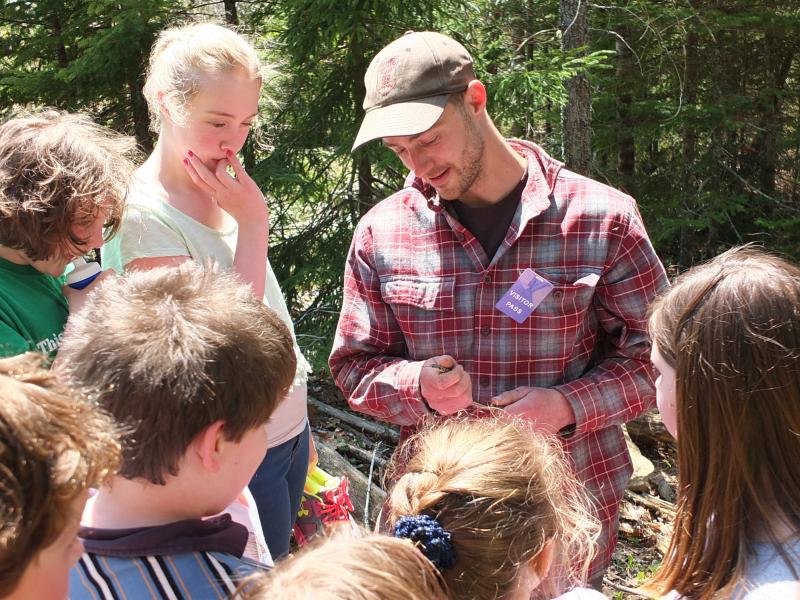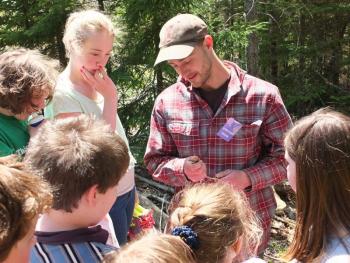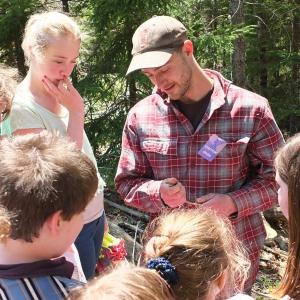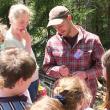Survival skills instructor trains Boothbay Region Elementary School students
 Head Instructor of the Maine Primitive Skills School Mike DiMauro shows a snake to students of Kathy Hartley's fourth grade class this past Monday, May 12. CASEY HOUSER/Boothbay Register
Head Instructor of the Maine Primitive Skills School Mike DiMauro shows a snake to students of Kathy Hartley's fourth grade class this past Monday, May 12. CASEY HOUSER/Boothbay Register
 Head Instructor of the Maine Primitive Skills School Mike DiMauro shows a snake to students of Kathy Hartley's fourth grade class this past Monday, May 12. CASEY HOUSER/Boothbay Register
Head Instructor of the Maine Primitive Skills School Mike DiMauro shows a snake to students of Kathy Hartley's fourth grade class this past Monday, May 12. CASEY HOUSER/Boothbay Register
Two fourth grade classes at Boothbay Region Elementary School received wilderness training this week from two prominent Maine-based survival skills instructors.
Mike DiMauro, head instructor at the Maine Primitive Skills School, and his assistant instructor Colby Smith attended the Boothbay classes as a guest instructor for both Kathy Hartley's and Nicole Levesque's classes this Monday and Tuesday, May 12-13. DiMauro explained the nature of his teaching, and how his students those days immersed themselves in nature, during an interview with the Boothbay Register.
“It's full-body learning,” DiMauro said. “The kids are having fun and they are engaged. They are interacting with the whole environment.”
“There is no test; no exam; no rote memorization. This learning is real.”
DiMauro has been teaching at MPSS for five years at day camps and school programs in a variety of settings. Smith has been working with the school since 2006 and began his official role as an instructor this year. MPSS conducts programs that focus on foraging, awareness, earth philosophy, scout and wilderness survival, primitive technology and tracking. It has programs that cater to adults as well as children.
The Register was able to follow Hartley's class on Monday during an afternoon session that lasted for nearly two hours from noon to 2 p.m. Immediately preceding the students' recess time, DiMauro gathered Hartley's class into a large circle in the middle of the school's soccer pitch.
He started their whole-body experience by handing a select number of students bandanas he said they would use in a game called “Hungry Hungry Seagulls.” The kids with without bandanas embodied the spirits of hungry seagulls while those with bandanas took on the spirits of French fries. The seagulls chased the french fries around the field and attempted to steal the bandanas which were tucked into their waist pockets. After several rounds of the game and 10 minutes of running, DiMauro spoke up.
“We're going to head into the woods,” he said. “We have some awesome activities planned.”
The kids marched along a well-worn trail that led behind the school's activity field. The five-minute hike placed the group in a clearing, and the kids' new instructor explained to them a second game. That one, called “Owl Eyes,” required that the kids stand in a circle, less one student specifically chosen to be the owl.
The circle group had a confederate who signaled periodically to the rest of the students that they should flap their arms or wave their hands.
Each owl stood in the center of the circle and attempted to use his or her peripheral vision to spot the group's confederate. Owls had three guesses to find their prey, and if they guessed incorrectly each time then the secret students revealed themselves.
DiMauro told the students that they could use their “owl eyes” to see a wider range of elements in their collective environment. The students further used that knowledge in their next activity: fox walking.
The kids took off their shoes and socks, and DiMauro explained to them how they should lift up their legs and place their feet down softly on the forest floor to creep quietly and smoothly.
After a bit of fox walking, they “weasel walked” (crouched lower to the ground) and walked down the path to the location of their next assignment.
The children experienced an even greater immersion of the senses in their following activity after DiMauro explained that he would pass out their bandanas once again. The kids tied the cloth around their heads to blind their eyes. DiMauro and Smith then led them to the edge of the well-worn trail and into the trees where they grasped onto a string that the instructors had tied from tree to tree in a path that traversed into and back out of the forest.
With shoes still off, the students relied on their hearing and fox walking while grasping the string and walking along the route. For the better part of a half hour, the forest was silent except for the cracking of sticks below the kids' feet. Hartley even joined in the action, traversing the environment alongside the rest. When everyone had finished, DiMauro and Smith conducted a debriefing and asked each child to relay his or her path walking experience.
Nearly every child offered his or her opinion, and as a whole, the group described an experience that included an awareness and struggle with relying on their senses of hearing and touch.
Two students in particular, Marissa Davison and Sean Marston, reached out with stories of struggle, hinting at the difficulty of the task that their instructors presented to them.
“I kept bumping into trees,” Davison said. “And I lost the rope a little.”
“It felt pretty long. Sometimes you have to go on different sides of the trees,” Marston continued, noting the same overall theme and speaking about a strategy many of the other kids employed.
Both Davison and Marston, among the rest of their classmates, were soon complimented by their leaders.
After the group's discussion, DiMauro explained the final activity of the afternoon. He said that, when people try to survive in the wilderness, they need to build shelters to keep themselves warm and dry. To replicate such survival, the kids split themselves up into groups of three, and DiMauro handed them each a notecard. They had 30 minutes to build structures that could survive the coming “storm.”
They built stone, wooden and leafy structures to protect their cards, and when the time came, DiMauro and Smith created “storms” by dumping water on the kids' enclosures. Before their respective deluges arrived, the kids explained their construction rationale. And afterward, the groups viewed how their papers fared. Several got wet, but many “survived the night,” DiMauro said.
Later that day, Hartley expressed her feelings about the event.
“It was the perfect classroom setting that mirrored a perfect indoor classroom,” she said.
“Kids need to slow down; they need to observe,” she continued, before saying that such exposure to outdoor activities can help kids achieve a sense of balance in their lives. “It was really refreshing.”
Funding for the two days of instruction was made possible by the school, which paid for the first day, and by a donation from Steve Malcom, CEO of the Knickerbocker Group.
More about the MPSS can be found at www.primitiveskills.com.
Event Date
Address
United States























